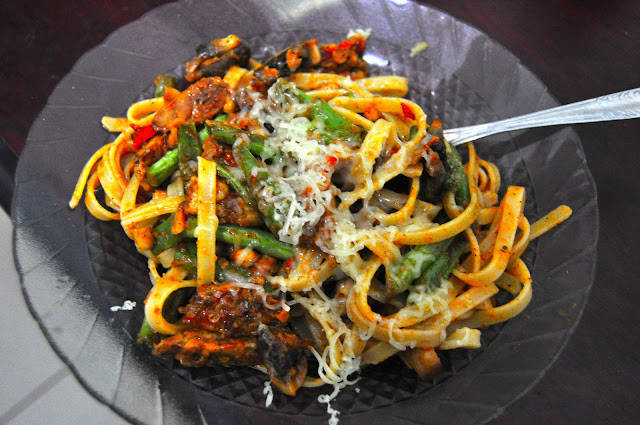On Language and Cultural Immersion
“You’re more Indonesian than Filipino now!” joked Mr. Dan Lapid, a visitor from the Philippines, as I sang along to a street performer on guitar playing the famous Noah song “Separuh Aku” at a food stall near Borobudur Temple. Mr. Lapid, a sanitation expert from an NGO in the Philippines, had just administered a three-day training session on ecological sanitation, which YDD helped to organize. This was Mr. Lapid’s one day to sight-see, and he had invited me to join him, along with a few of my colleagues.
“Just wait ’til you hear me sing Filipino songs on karaoke!” I joked back. He laughed.
 |
| with Mr. Lapid, co-workers, and friends at Borobudur Temple |
Mr. Lapid's comment, though spoken in jest, is actually something I’ve been thinking about lately. People here tell me that I look very Indonesian. And the manner in which I’ve been able to blend in Indonesian society, due to appearance-bias and my ability to speak basic Indonesian, has been an endless source of fascination to me. In many ways, it has worked to my advantage, especially when bargaining on Jalan Malioboro (the famous shopping street in Yogyakarta), and also when v siting famous tourist sites, where I am never asked to be taken in photos with strangers.
On the other hand, as is perhaps inevitable, it has gotten me thinking about identity issues. I recognize that shame I feel at my inability to speak the language of my motherland. Despite my heritage, how much do I really know about Filipino culture if I can’t speak Tagalog (Filipino)? Ever since I’ve been in Indonesia — living and working and trying to blend in — this question has become even more prominent in my life.
 |
| with Mr. Lapid, co-workers, and friends at Tamansari |
I froze in response. It was a deer-in-headlights moment. Familiar with basic Tagalog, I understood what she was asking, but the only responses I could think of were all Indonesian: Boleh saya minta… Saya mau… These words fired about in my head, and I was confused about what to do. So instead of saying anything, I smiled and pointed, as I used to do when I first arrived in Indonesia. The lady smiled and asked me, in Tagalog, where I was from. I responded in English: “I’m from America… but I was born in the Philippines.”
If anything, learning Indonesian and immersing myself in this previously unfamiliar country, has given me a new sort of conviction. If I can learn Indonesian, if I can joke in Indonesian with my co-workers, and if I can ask questions in Indonesian to a farmer on Flores Island, who’s to say that I can’t one day immerse myself in my family’s culture?
Before leaving for Borobudur, Mr. Lapid said to me, “Maybe I can convince you to come to Manila!”
I laughed and responded, “There’s no need to convince me! I plan on going there someday.”































